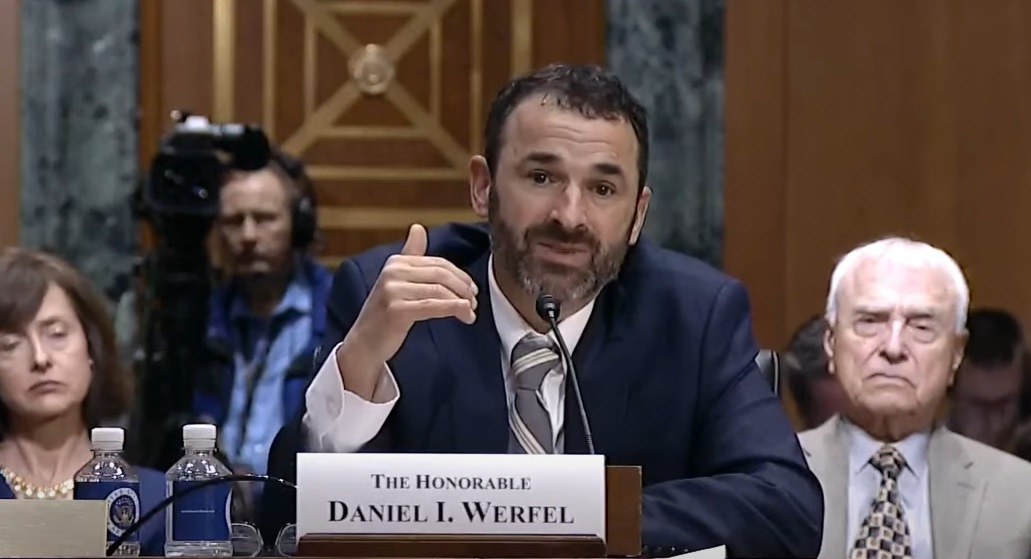Taxes
IRS Chief Daniel Werfel Says He Is ‘Deeply Concerned’ About Racial Bias in Audits
An academic study revealed that Black Americans are up to five times more likely to be audited than taxpayers of other races.
May. 17, 2023

In response to a study by Stanford University researchers that concluded Black Americans are up to five times more likely to have their federal tax returns audited than taxpayers of other races, new IRS Commissioner Daniel Werfel said initial results of an internal investigation confirmed the researchers’ findings, said he is “deeply concerned” by the apparent racial disparity in the selection of tax returns for audit, and pledged he will “stay laser-focused on this to ensure that we identify and implement changes prior to next tax-filing season.”
Werfel’s comments were made in a letter dated May 15 to Sen. Ron Wyden (D-OR), chairman of the Senate Finance Committee. Following the release of the Stanford University study in early February, Wyden and other lawmakers demanded the IRS review and make changes to its auditing processes.
The higher audit rate for Black taxpayers is due to a flawed artificial intelligence algorithm used by the IRS to decide who gets audited, the study’s authors said. The researchers said there’s no evidence that IRS agents—who don’t see the race of a tax filer—are purposely discriminating against Black Americans. However, the IRS could eliminate the disparity by auditing people with complex tax returns and taxpayers who underreport their income, they said.

During Werfel’s confirmation hearing before the Senate Finance Committee on Feb. 15, Wyden asked Werfel, “Will you commit within 60 days of being confirmed that you will get back to us and give us the underlying reasons, in your view, why there is this discrimination and what you’ll do to correct it within 60 days?”
Werfel responded, “I will absolutely, as soon as I get to the IRS, talk to those individuals that are working this issue and report back to you on what we’re finding.”
Werfel was confirmed by the Senate as the next IRS commissioner in March. The following is the letter Werfel sent to Wyden on Monday about racial bias in IRS audits and how the agency will address it:
Dear Senator Wyden:
This letter is in response to your request for information about the apparent racial disparity in the selection of tax returns for audit, along with our plan to address this issue.
Let me start by stressing that the IRS is committed to enforcing tax laws in a manner that is fair and impartial. When evidence of unfair treatment is presented, we must take immediate actions to address it. It is also important to reiterate that we do not and will not consider race as part of our case selection and audit processes. Nevertheless, a recent study estimated, using imputed race values, that Black taxpayers are audited at three to five times the rate of non-Black taxpayers. The research further suggests that most of this disparity is driven by differences in correspondence audit rates among taxpayers claiming the Earned Income Tax Credit (EITC). We are deeply concerned by these findings and committed to doing the work to understand and address any disparate impact of the actions we take.
As soon as I was confirmed, I met with the IRS team that has been studying this issue. Their research is ongoing and additional time is needed to yield a robust understanding of the drivers of this disparity and to thoroughly evaluate the right potential programmatic changes to address it. In this letter, we provide our initial findings. I want to note that fairness in audit selection is a complex topic, and our initial findings will evolve as the work continues. IRS does not collect data on race and there is substantial uncertainty in any estimates of the audit rate by race or differences in audit rate by race.
While there is a need for further research, our initial findings support the conclusion that Black taxpayers may be audited at higher rates than would be expected given their share of the population. We are dedicating significant resources to quickly evaluating the extent to which IRS’s exam priorities and automated processes, and the data available to the IRS for use in exam selection, contribute to this disparity. As part of this work, we are evaluating the potential impact of methodological changes to case selection (e.g., optimizing on broader tax issues rather than focusing on EITC overclaims). As this work progresses, additional information will be shared externally regarding the research findings and the appropriate corrective actions IRS will take.
I will stay laser-focused on this to ensure that we identify and implement changes prior to next tax filing season.
As we continue to evaluate ways to address any bias that exists within our audit program, the IRS will take steps to advance our commitment to fair and equitable tax administration more broadly. In the Inflation Reduction Act (IRA) Strategic Operating Plan, the IRS committed to conducting research to understand any potential systemic bias in compliance strategies and treatments. We will work to identify any disparities across dimensions including age, gender, geography, race, and ethnicity as well as continually refining our approaches to compliance and enforcement to improve fairness in tax administration and maintain accountability to taxpayers as informed by our research. The ongoing evaluation of our EITC audit selection algorithms is the topmost priority within this larger body of work, and we are committed to transparency regarding our research findings as the work matures.
The Inflation Reduction Act funding will allow us to focus even more attention on reaching underserved communities to provide education and real-time assistance in claiming available credits and incentives. This will help to promote the uptake of credits and incentives and ensure that all taxpayers have a better understanding of eligibility and documentation requirements for such provisions. Legislative changes streamlining eligibility requirements could support our education efforts, reduce honest mistakes, and improve administrability.
We are also working to advance equitable tax administration by holding accountable unscrupulous return preparers who fail to exercise due diligence and disadvantage taxpayers through poor-quality advice. The proposal outlined in the Fiscal Year 2024 Treasury Greenbook includes expanded and increased penalties for unscrupulous preparers. In addition, the IRS is accelerating an existing research effort that aims to detect and ensure compliance among “ghost preparers,” i.e., individuals who receive compensation to prepare returns for others but do not identify themselves to the IRS. Initial evidence confirms that unscrupulous and ghost preparers disproportionately prepare returns in minority communities.
In summary, we are making broad efforts to advance our commitment to fair and equitable tax administration and evaluating the best ways to address bias within our audit program. I expect to be able to update you and the committee on a regular basis on our progress on these initiatives. I hope this information is helpful and look forward to discussing any questions or concerns you may have regarding our plan to address this important and challenging problem.
Sincerely,
Daniel I. Werfel
Commissioner
In a statement on Monday, Wyden said as the IRS overhauls its approach to tax enforcement with the nearly $80 billion in funding the agency received from the Inflation Reduction Act, he will ensure that any type of racial bias be eliminated.
“Commissioner Werfel has committed to implement changes to fix this issue before the next tax-filing season begins, but it’s clear there’s more to learn and a lot of work to be done. As chairman of the Senate Finance Committee I expect the IRS to provide regular, public updates on their progress,” Wyden said.
